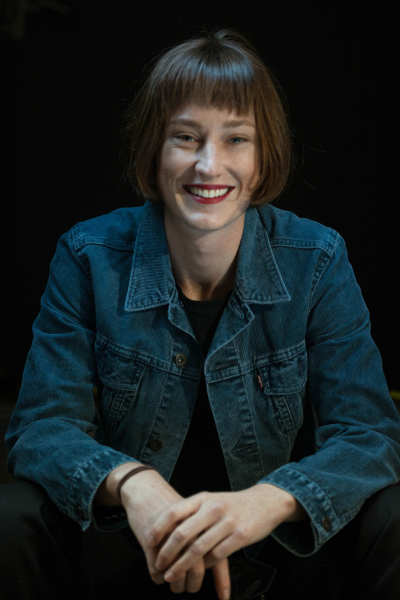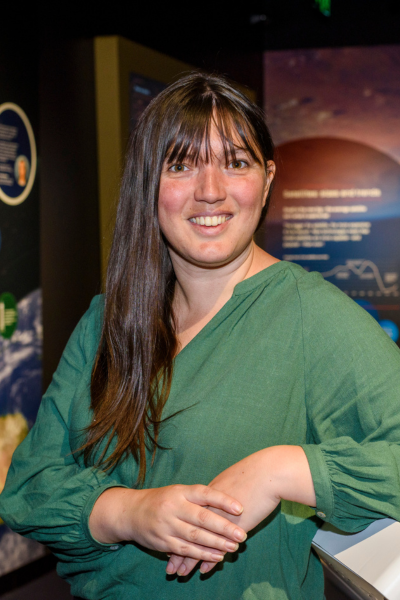Two rising SmartSat CRC PhD students have been selected for a SmartSat-led internship program at NASA Jet Propulsion Laboratory to kickstart their successful aerospace career.
Aspiring space leaders Anne Bettens, from the University of Sydney, and Emily Ahern, from the University of Adelaide, have been paired with an expert mentor from JPL for the duration of their internship, providing them one-on-one access to an expert in their area of study. This pilot program with NASA JPL aims to set a blueprint for future internship opportunities with global space organisations.
JPL is a research and development lab federally funded by NASA and managed by the California Institute of Technology (Caltech). The centre leads the world in robotic space exploration and science, sending spacecraft all through the solar system, rovers such as Perseverance and Curiosity to Mars, a slew of Earth Science missions and providing cameras to the James Webb Space Telescope project.
 SmartSat PhD student Anne Bettens is currently undertaking an internship at NASA JPL in California, US.
SmartSat PhD student Anne Bettens is currently undertaking an internship at NASA JPL in California, US.
 SmartSat PhD student Emily Ahern will leave for her internship at NASA JPL in California, US later this year.
SmartSat PhD student Emily Ahern will leave for her internship at NASA JPL in California, US later this year.
SmartSat CRC Chief Research Officer Dr Carl Seubert, who previously worked at NASA JPL for nearly a decade, said it was challenging to narrow down the two successful applicants from the many high-calibre applications received, demonstrating the incredible potential that exists within the Australian space research ecosystem.
“We had many exceptional PhD students apply for this NASA internship, which is a testament to the skills being developed through SmartSat’s research portfolio for Australia’s fast-growing aerospace industry. Both Anne and Emily have shown great dedication to their research and the innovation of Australian space technology”, says Dr Seubert.
“I had an out-of-this-world experience at JPL working alongside experts on challenging technologies and the best missions, and I want to share that with other Australians. This program provides our students an invaluable opportunity to learn from some of the greatest aerospace engineers and scientists in the world and forge international collaborations that will last their careers.”
Anne Bettens, PhD candidate in the University of Sydney’s School of Aerospace, Mechanical and Mechatronic Engineering. Her work is focused on autonomous navigation of spacecraft. Anne has previously been involved in projects with Thales Alenia Space and ISAE-SUPAERO in France, researching space debris pose estimation using machine learning and silhouette imagery. Anne has published several academic papers and presented at various conferences, including the 2022 International Aeronautical Congress in Paris.
Anne Bettens, who started her internship in March 2023 at NASA JPL, says she is gaining further technical knowledge while positively contributing to a lunar navigation project at JPL.
“My current area of research is autonomous navigation of robotic craft for space exploration. This is a great opportunity for exposure to robotic hardware at JPL, particularly on the research and development side. I’m becoming more familiar with the robotic technologies being developed by JPL for planetary and lunar exploration, which is a highly relevant area to my PhD research.”
Emily Ahern is a Physics PhD student at the University of Adelaide. Her work focuses on developing a compact optical clock for small satellites. Emily has presented her work at several conferences, most recently at the combined Australian and New Zealand Conference on Optics and Photonics (ANZCOP) and the Australian Institute of Physics Congress at the end of 2022.
Emily, who will embark on her NASA JPL internship journey in June 2023, says she’s excited about the opportunity to further her knowledge in atomic clocks, learning from leading names in the fields of timing and precision measurement.
“I am hopeful I will be able to contribute to the cutting-edge atomic clock research at JPL, where an in-orbit mercury ion atomic clock was recently demonstrated. The opportunity to learn from leaders in my area of research is invaluable, and I’m looking forward to the experience.”
Anne Bettens’ postdoctoral supervisor, Dr Xiaofeng Wu from the University of Sydney’s School of Aerospace, Mechanical and Mechatronic Engineering, said: “Anne is an exceptional PhD candidate at the University of Sydney, showcasing a passion for space exploration that has driven her to pursue a career in the space industry. As a young entrepreneur with abundant creativity, she will no doubt emerge as a future leader in the Australian space industry. The JPL internship represents a milestone for Anne to achieve success in her career.”
Professor Andre Luiten, Director, University of Adelaide’s Institute for Photonics and Advanced Sensing, congratulated Emily on her selection.
“I am delighted that Emily’s talent and dedication have been recognised through this internship, which will give her the valuable opportunity to interact with world-leading space researchers at NASA. It highlights the globally leading nature of Emily’s work with the University of Adelaide’s Institute for Photonics and Advanced Sensing, which has led to this opportunity from NASA to collaborate.”
SmartSat CRC has a strong industry-focused doctoral program which is actively building Australia’s high-tech space knowledge. Now in its third year, the program has already offered over 60 PhD student scholarships and aims to deliver education grants to more than seventy PhD graduates.
Download the full media release here.